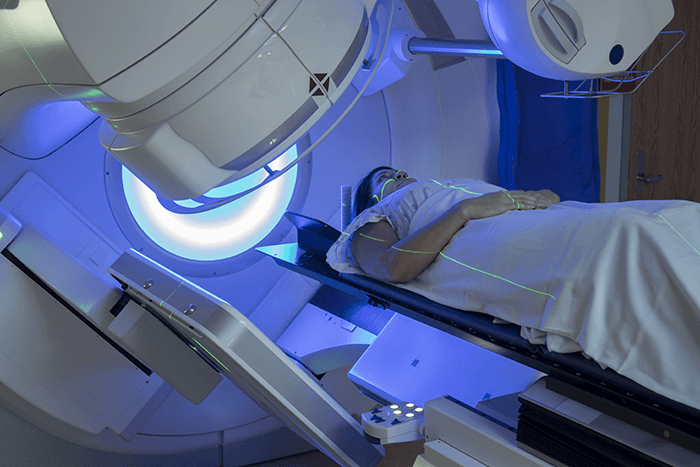Radiation therapy for malignant mesothelioma uses X-rays and other energy beams to shrink tumors and slow the spread of cancer cells. It is sometimes paired with surgery or chemotherapy as a life-extending, curative treatment option. It can also be used as palliative care to alleviate symptoms.
What Is Mesothelioma Radiation?
Radiation therapy, also called radiation or radiotherapy, uses high-energy waves and particles to damage the DNA of cancer cells. When cell DNA becomes damaged, the cells stop dividing and eventually die, shrinking tumors and slowing the spread of cancer through the body.
Radiation is more commonly used for pleural mesothelioma (develops in the lining of the lungs) than for peritoneal mesothelioma (develops in the lining of the abdomen). This is because the organs in the abdomen may be inadvertently damaged during the treatment process.

How Radiation Is Used to Treat Mesothelioma
Radiation therapy is most effective when applied to a single, distinct tumor. Because mesothelioma is usually diagnosed after it has spread throughout the body, radiation isn't always the most effective therapy.
Mesothelioma patients who are eligible for radiation therapy may receive the treatment as a curative or palliative option, depending on the specifics of their cancer.
Curative Radiation for Mesothelioma
When radiation is used as a curative measure, its intended goal is to prolong life expectancy by removing tumors.
Curative radiation for mesothelioma may be applied before surgery to help shrink tumors and make them easier to remove. It may also be used after surgery to help kill cancer cells left behind and prevent the mesothelioma from returning.
Palliative Radiation for Mesothelioma
In patients with late-stage mesothelioma, radiation therapy is often used as a palliative treatment to reduce symptoms like pain, shortness of breath, or difficulty swallowing. It can be a good option for patients not eligible for aggressive curative treatments.
Mesothelioma Radiation Prognosis
When paired with other therapies, mesothelioma radiation can play a significant part in increasing patients' overall survival.
According to a study by the American Association for Thoracic Surgery, pleural mesothelioma patients who underwent radiation therapy had a median survival of 51 months.
This represents a significant improvement over patients who did not undergo the treatment, whose median survival was only 17-20 months.
In April 2023, European researchers reported that pleural mesothelioma patients who received a higher dose of radiation as part of a clinical trial called SYSTEMS-2 had a significant increase in life expectancy.
Not sure what doctor to choose when looking into using radiation as treatment for mesothelioma? Use our Doctor Match to find the best doctor near you.
Types of Mesothelioma Radiation
Several types of radiation therapy can be used to treat mesothelioma patients. Which type you might receive, if any, depends on a number of factors — like where your cancer is located and whether you will be receiving other types of cancer treatment at the same time.
Work with your mesothelioma doctor to determine which type of radiation therapy is best for you.
External Beam Radiation Therapy (EBRT)
External beam radiation therapy (EBRT), which uses a machine to aim high-energy waves or particles at the site of the cancer, is the most common type of mesothelioma radiation.
EBRT is painless, and treatment lasts only for a few minutes. However, if you have an EBRT appointment, plan for it to take about 15-30 minutes since it takes time for the technician to set up the equipment and properly position you.
A regular course of external radiation therapy lasts 5-8 weeks, with most patients receiving treatment 5 days a week. Like all cancer treatments, this can vary based on individual needs.
What to Expect During External Beam Radiation Therapy
Intensity-Modulated Radiation Therapy (IMRT)
Intensity-modulated radiation therapy (IMRT) is a type of EBRT in which the angle, direction, and intensity of the radiation can all be adjusted from moment to moment.
High doses of radiation can be used on some areas of the malignant tumor, while lower doses can be used in areas where the cancer is close to or mingled with healthy tissue that the mesothelioma doctors want to preserve.
Brachytherapy
Brachytherapy, or internal radiation therapy, is not yet a common treatment for mesothelioma, but it is being studied as part of several clinical trials.
Patients receiving brachytherapy have a source of radiation placed in or near the site of the cancer, meaning that healthy tissue won’t be exposed to radiation.
Many different types of implants can be used as a source of radiation, including wires, tubes, and capsules. Some types of implants are meant to be temporary, and others are left in place permanently.
Radiation Therapy in Clinical Trials
Through radiation therapy clinical trials, researchers study new ways of combining radiation with mesothelioma surgery. One of these ways is called Surgery for Mesothelioma After Radiation Therapy (SMART), and it’s being studied for use in patients with resectable (surgically removable) pleural mesothelioma.
With SMART, higher-than-average doses of radiation are targeted at the cancer site in an effort to shrink existing tumors and decrease the chance that mesothelioma cells will be left behind after surgery. This surgery takes place 1-2 weeks after radiation therapy ends.
A more intense version of the treatment, Surgery for Mesothelioma After Radiation Therapy Using Extensive Pleural Resection (SMARTER), is also currently in trial. With SMARTER, more tissue is removed through surgery.
While studies of these treatment methods are ongoing, early results are promising. The mortality rate is comparable with other aggressive cancer treatments, and patients show improvements in median overall survival compared to the average.
Patients not responding well to standard mesothelioma treatment (surgery, chemotherapy, or radiation) can consider joining a trial. An experienced doctor can help you decide if a clinical trial is right for you.
- Alabama
- Alaska
- Arizona
- Arkansas
- California
- Colorado
- Connecticut
- Delaware
- Florida
- Georgia
- Hawaii
- Idaho
- Illinois
- Indiana
- Iowa
- Kansas
- Kentucky
- Louisiana
- Maine
- Maryland
- Massachusetts
- Michigan
- Minnesota
- Mississippi
- Missouri
- Montana
- Nebraska
- Nevada
- New Hampshire
- New Jersey
- New Mexico
- New York
- North Carolina
- North Dakota
- Ohio
- Oklahoma
- Oregon
- Pennsylvania
- Rhode Island
- South Carolina
- South Dakota
- Tennessee
- Texas
- Utah
- Vermont
- Virginia
- Washington
- Washington DC
- West Virginia
- Wisconsin
- Wyoming
Speak with our trusted advocates to learn more about mesothelioma specialists in your state.
Side Effects of Mesothelioma Radiation
Mesothelioma radiation side effects vary widely from person to person. Side effects may be short-term and easily treatable, or they may be long-term and more severe.
Common side effects of radiation therapy for pleural mesothelioma include:
- Fatigue
- Hair loss on the chest
- Low blood counts
- Skin irritation
Additional side effects may also occur based on the location of the mesothelioma.
Someone with pleural mesothelioma, where the radiation would be focused on the chest, may experience side effects like shortness of breath and difficulty swallowing. Patients with peritoneal mesothelioma may experience nausea, vomiting, and/or cramping.
Some side effects of mesothelioma radiation therapy can be managed through lifestyle changes and medication. Patients should inform their treatment team about how they feel before, during, and after radiation therapy in case adjustments need to be made to the treatment plan.
Find a Mesothelioma Cancer Center Near You
A mesothelioma diagnosis is devastating, and hunting for information about treatment options and doctors can feel overwhelming.
If you or someone you love has been diagnosed with mesothelioma, it’s important to know that help is out there. For more information on how to access radiation therapy and other treatments, get our Free Mesothelioma Veterans Packet.
To find a mesothelioma cancer treatment center closest to where you live, call our team of Patient Advocates today at (877) 450-8973.
Mesothelioma Radiation FAQ
Is radiation treatment painful?
Radiation treatment sessions for mesothelioma are painless. In fact, this therapy is designed to reduce the painful symptoms that accompany a mesothelioma diagnosis.
When can radiation be used in the treatment process for mesothelioma?
There are several ways doctors can administer radiation therapy for mesothelioma patients:
- Adjuvant Radiation: Doctors prescribe this treatment after the patient has undergone surgery, directing the radiation beams at the area where the cancer used to be.
- Neoadjuvant Radiation: Doctors also give radiation before surgery in an effort to reduce the size of tumors, which can make surgery more successful.
- Palliative Relief of Pain: Radiation has the capacity to relieve pain in patients whose cancer has spread to the lymph nodes or chest wall. Patients can get radiation after surgery if pain arises from mesothelioma tumor recurrence.
- Prevention of Seeding: Mesothelioma can spread along surgical incisions and biopsy sites through seeding. There is some evidence that directing radiation at these areas decreases seeding, though research is inconclusive.
Is radiation better than chemotherapy?
Neither chemotherapy nor radiation is inherently better than the other, but your doctor may only prescribe one of the two depending on the specifics of your cancer. Other times, mesothelioma radiation is used in conjunction with chemotherapy to produce the best results.
Your oncologist (cancer doctor) will determine which mesothelioma treatment is best for you.
How much does mesothelioma radiation cost?
The cost of mesothelioma radiation can vary widely depending on the location of the cancer and the length of the treatment. One study found that patients with Medicare could expect costs ranging from $7,300-$25,500 for the course of their radiation treatment.
Veterans who have developed mesothelioma due to asbestos exposure while serving in the U.S. military may be entitled to VA benefits like free medical care and financial compensation.



